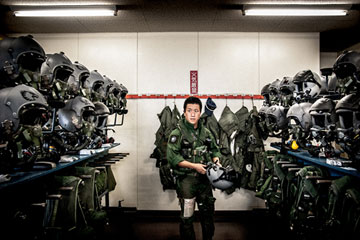
These days, Japanese pilot Kohta "Vader" Araki, who flies F-15s, is always on alert.
(6 of 7)
It's true that Abe's party triumphed in recent polls. But the LDP won the past two ballots with fewer votes than when it was trounced in 2009 by the former ruling Democratic Party of Japan (DPJ). The LDP's most recent electoral victories owed more to voters' disgust with the DPJ than an endorsement of Abe's worldview. "The last two elections were about the economy, the economy, the economy," says Taro Kono, an LDP legislator. Still, the Abe administration has articulated a consistent theme: Japan's economic and military futures are inextricably tied. "Abe is very up-front about his personal philosophy, which is that he's interested in a strong state that can defend its people and compete internationally," says Tobias Harris, a Washington-based Japan analyst with Teneo Intelligence. Harris notes the historical precedent of 19th century Japanese modernizers who reformed a once closed nation under the motto "Rich nation, strong military." "[Those reformers] believed that if they didn't modernize, they would be gobbled up by the imperial powers; Abe brings that thinking to the 21st century. That's very dangerous."
Right Is Might
One of the unlikely showcases of Japan's military prowess is a radar facility that looms like a giant golf ball, atop a hill overlooking sugarcane fields and picture-postcard beaches. The SDF base, on Okinawa's Miyako Island, is a frontline one, and its 160 personnel have been particularly busy since the Senkaku-Diaoyu tiff escalated last year. Living full time on the typhoon-battered base isn't easy.
But the soldiers' hardship posting is at least more appreciated now by the Japanese public. Approval for the SDF has skyrocketed in recent years, particularly after soldiers aided the 2011 natural-disaster-relief effort. A popular TV drama this year followed the fictional love lives of a female TV director and an SDF officer. In a nation obsessed with all things cute, the SDF promotes itself through cartoon mascots named Pickles and Parsley. (Pickles and parsley are strong but ultimately pleasing tastes, just like the SDF, apparently.) "People used to call us 'tax robbers' before," says Air Self-Defense Force Major Yasuhisa Furuta. "Now the situation is totally different." SDF enlistment is up, and its veterans even serve in parliament--the likes of Masahisa Sato, a mustachioed retired colonel who commanded Japanese peacekeepers in Iraq. Unsurprisingly, Sato supports a constitutional revision. "When I entered the SDF 30 years ago, I never imagined that we could be discussing constitutional reform so openly," he says. "Japan is becoming an ordinary country, and the SDF an ordinary military."
